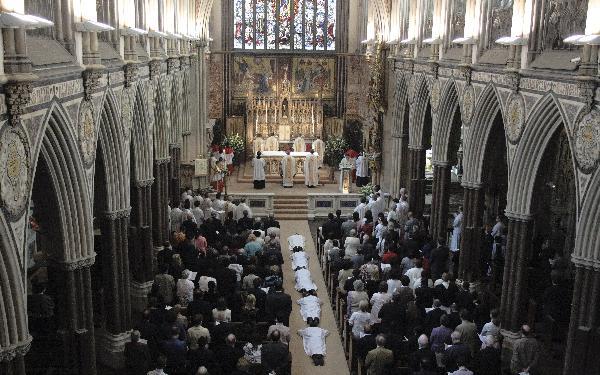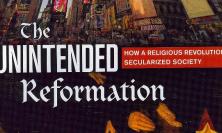On 2nd May at Farm Street Church in London, 5 Jesuits were ordained to the Diaconate by Bishop George Stack. In his homily, Bishop Stack spoke of the ministry that the new Deacons are being called to undertake, and the love of God that will comfort and guide them, and all those they serve.
When I was young, I was taught that you should learn to pray with the Bible in one hand and the newspaper, or perhaps today the Internet, in the other. The point being that one purpose of our prayer is to bring together the different worlds each one of us inhabits, to integrate the outer world with our inner world, so that the different dimensions of life – the physical, psychological, intellectual and spiritual – may be made whole, may become truly holy.
During each Mass we are nourished at the Table of God’s Word and the Table of His Sacrament. The passages from scripture that are proclaimed during each celebration point towards the Word of God, made flesh in the person of his son Jesus Christ. The words he spoke in the Synagogue at Nazareth are being fulfilled today, even as we listen. They are words from the Servant Song of the prophet Isaiah, who describes a messianic figure, an anointed one, the one who is signed and sealed and empowered to transform the most negative of human experiences. Knowing what constitutes true freedom and liberty, through his integrity, he is able to personify it in his confrontation with anything that would separate us from God. In the Last Will and Testament of Jesus (John 15:9-17), Jesus reveals what gives us access to his love and friendship – obedience. This obedience is not an imposition from outside. Not a restriction of human liberty. Not conforming to rules and regulations. Ob-audire – an attentive listening with mind and heart to the impulse of God’s spirit, heart speaking to heart in the silence of the heart. This is how we comprehend that at the heart of God there is a place for me: loved, sustained, healed, forgiven. On what other basis dare our new deacons make the radical gift of their right to intimacy and marriage and a family of their own, in order to live in a celibate state as a sign of the love which they are experiencing and are prepared to offer to others? This ob-audire makes it possible for us to understand and experience the meaning of the commandment ‘Love one another as I have loved you’. The Word of God is indeed something alive and active. It cuts like a two-edged sword.
A moment ago the candidates for ordination were called by the Church in a very formal way. But that calling was an accumulation of the many calls our Deacons-to-be have heard and to which they have responded throughout their lives. They will know there are often conflicting voices calling them – and us – to do many different things in life. But through the circumstances of their lives, through their openness to discern God’s purpose for them, they have heard this voice calling them incessantly to be his friends. ‘You did not choose me, I chose you’. And why? So that each one may bear the fruit of proclaiming the favour of the Lord, which they have experienced already, to those they will be called to serve.
The Rite of Ordination expresses these truths in a language of sign, symbol and sacrament; a language which goes deeper than words, which goes beyond words. The candidates prostrate themselves before the altar, a sign of abandonment to the love of God, a sign of unworthiness to be called his friend, and a sign of total dependence on him. The Laying on of Hands and prayer of Consecration, that ancient apostolic gesture, links them to the ministry of the bishop, and through him to the ministry of the first witnesses to Christ, his apostles.
They will be clothed in the Deacon’s stole and Dalmatic. This will remind them of many things, not least that in a new way they will each ‘put on Christ’. In this ministry they will be enveloped by the love of Christ in new ways as they become signs of that loving presence to others. And they will learn that these vestments cover up human frailty and inadequacy, reminding them that as Deacons the message they proclaim is not themselves, but Christ crucified.
The ordination of Deacons concludes with the presentation of the Book of the Gospels, the word of life and love on which their lives and ministry will be based. From the gospel they will draw inspiration to pray, to study and to preach. Our new Deacons will learn very quickly that God’s word is not authentically proclaimed just by standing in a pulpit, or even sitting in a chair; it is preached in the holiness of the actions of our lives. That is why the words spoken by the bishop to the one ordained as Deacon are both a comfort and a challenge: ‘Believe what you read. Teach what you believe. Practise what you teach.’
But there is another word which is a prayer on the part of all who have brought those who are to be ordained to this day. The prayer looks forward to the years that lie ahead. ‘May God who has begun the good work in you bring it to fulfilment.’ Amen.
Right Rev George Stack is Auxiliary Bishop of Westminster and Titular Bishop of Gemellae in Numidia.






